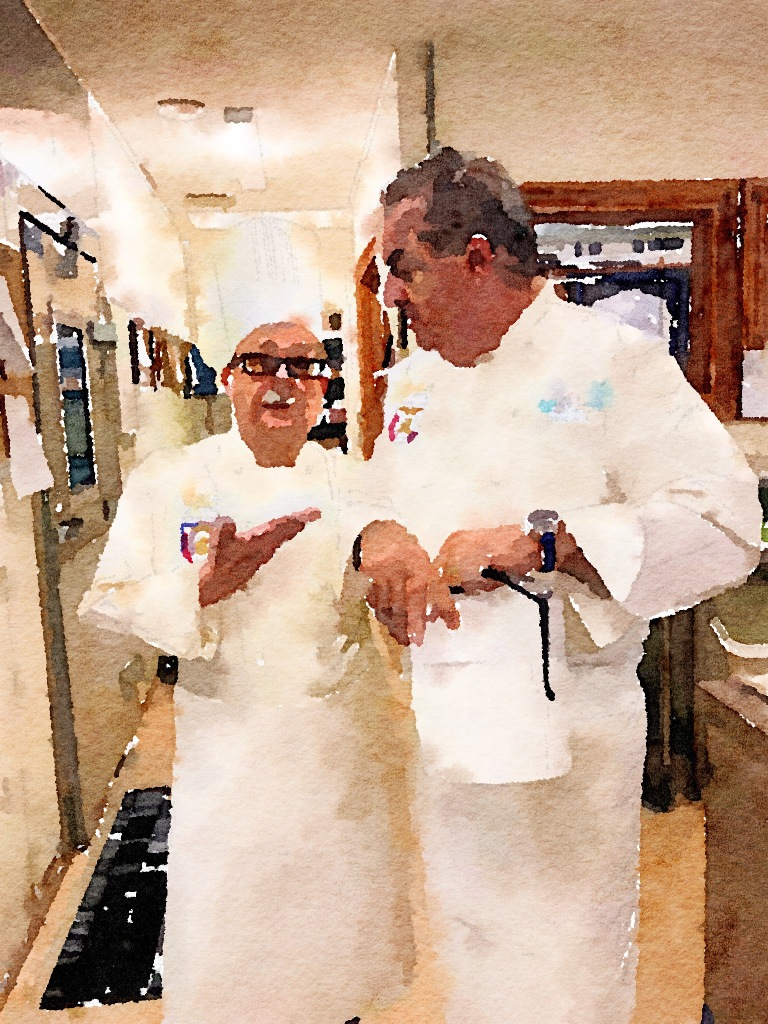
It is the classic diatribe – “I can do that better that the chef. I’ve been cooking for 15years now; I should be the chef.” Fine, that may be the case but let’s just see. If it’s your time and you’re ready then make it happen, find your spot, push for the job, step up and show them what you’ve got. But, for a moment, let’s take inventory:
[] CHECK YOUR REPERTOIRE: You need not remember every ingredient, in every dish, but you must understand the methods and the result. Is there breadth to your understanding of cooking, cooking techniques, and ingredients? Have you experienced the flavors and presentations of the items that may grace your menu? Can you adapt to various cuisines and although you may not master them, do you feel comfortable making an attempt at it? Do you understand the seasonality of ingredients and how to adjust for less than stellar quality or substitute ingredients that will bring you close to the same result in a recipe?
[] WHAT DO YOU KNOW ABOUT WINE: Is the wine list solely the responsibility of the sommelier, lead bartender, or dining room manager? If you think the answer is YES, then you are not ready to be the chef. Wine is part of the experience, and it has an impact on the food experience just as the food experience impacts wine. The chef must be able to speak the language, build the palate, and understand how this relationship works. Chef’s study wine.
[] WHAT DO YOU KNOW ABOUT THE MEAT YOU BUY: Do you understand the animal and how its anatomy, nutrition, breed, and care determine the quality on your plate? Can you select quality in meat by looking at marbling of fat, yield of meat compared to bone and fat, and color? Do you understand the difference between dry and wet aging? Can you plan a menu focused on total utilization of meat and carcass? Chef’s study the proteins they use, respect the animal, and understand how the animal is raised.
[] HAVE YOU EVER PLANNED A MENU TO SUIT THE NEEDS OF A PARTICULAR CLIENT: Sure, you know how to produce the dishes you have prepared in the past and have worked with dozens of menus before. Is this the extent of your knowledge of menu planning? Could you plan a menu for vegetarians and vegans, a traditional kosher wedding, a reception for a Cajun jazz festival, or a seven course French tasting menu? Chefs have the experience to do this or the network of professionals who can serve as a planning resource.
[] HAVE YOU EVER DEVELOPED, STANDARDIZED, AND THEN TRAINED STAFF TO PREPARE A NEW MENU ITEM: Start to finish, the right way to bring an item to the menu is to go through this process until all the “I’s” are dotted and the “T’s” are crossed. Have you worked through this process hundreds of times before?
[] CHECK YOUR LEADERSHIP: Do you know the difference between leadership and management. Both are necessary, but only leaders provide vision, promise, and hope of great things to come. Leaders inspire, are trustworthy, and shine as people to follow. Have you proven yourself in this regard?
[] CAN YOU TALK THE TALK: Are you a resource that others look to? Do you have a broad enough base of knowledge that speaks to competence and confidence? Chef’s do.
[] CAN YOU WALK THE TALK: You may have the knowledge, but do you also have the track record of getting things done? Do you under promise and over deliver or just the opposite?
[] HOW ABOUT YOUR PROBLEM SOLVING: Things will go wrong – this is a fact. Have you experienced enough outside of your station in the kitchen to make things right? Do you look at problems as roadblock or steppingstones? As a chef it will be your job, more often than not, to solve problems – to make things right, to find solutions.
[] HOW WOULD OTHERS ASSESS YOUR GRACE UNDER FIRE: How’s that temper of yours? Are you easily frustrated, disappointed, angry, at a loss for solutions, or distracted from the issue at hand? Can others depend on you to keep a level head?
[] HAVE YOU EVER BUILT A BUDGET AND MANAGED IT EVERY DAY: Ah, yes, we love to cook and present beautiful plates of food. You are good at that, after all you have been cooking for 15years. But here’s a curve ball – restaurants need to earn a profit and that isn’t easy. Do you have a track record for building effective budgets and managing them to turn a profit? The best cooks in the world who can’t keep the restaurant financially viable will never last in the role of chef.
[] HAVE YOU EVER INTERVIEWED, HIRED, TRAINED, EVALUATED, OR FACED A NEED TO LET AN EMPLOYEE GO: It’s all about team and if there is one task that shines above all else it is the ability of a chef to judge the quality of applicants, orient and train them well, mentor and inspire those employees, and effectively manage them as members of a team. How do you fare in this regard?
If you answered YES to all these questions, then you may just be ready to hold the position of chef. If not, then allow this to serve as a roadmap. If you want the title, then work for it.
PLAN BETTER – TRAIN HARDER
Harvest America Ventures, LLC
Restaurant Consulting
www.harvestamericacues.com BLOG
(Over 800 articles about the business and people of food)
CAFÉ Talks Podcast
https://cafemeetingplace.com/cafe-podcasts
More than 70 interviews with the most influential people in food

Leave a comment